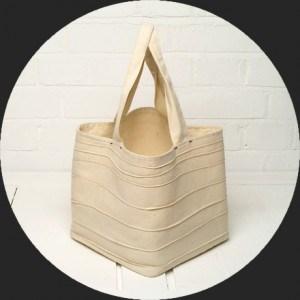
Ecopreneurist highlights Re-wrap, a UK-based social enterprise that works with low-income communities in India to create high-quality recycled and reusable textile products. Re-wrap founder Janjiri Trivedi started the organization after she saw artisans in Kutch continuing to create handricrafts after many of their livelihoods had been affected during the earthquake in India is 2001. Learning that an increasing number of artisans, however, were moving to urban areas to find work, Trivedi wanted to create an opportunity for such artisans to remain in their traditional line of work. Re-wrap was therefore created as a way to connect artisans in India with businesses abroad. The organization’s products are all made of locally sourced natural and organic cotton fabrics and profits are reinvested back into the communities.
Can a company create up-cycled textiles products, revive a community and preserve age-old design skills? A business with a vision surely can. re-wrap is one such self-funded UK-based social enterprise established in 2002.
Their mantra is simple enough but one with tremendous impact!
Re-cycle and create re-usable textile products. Re-claim traditional skills as contemporary design. Re-invent the lives of artisans in India with hope and purpose.
re-wrap is an innovative and sustainable not-for-profit cooperative for re-usable textile products. Their products are made by disadvantaged communities in India to help them gain economic independence and serve well-meaning businesses who share their vision. They work directly with skilled but marginalized communities in India, enabling them to create high quality, re-usable and sustainable textile products. Combining traditional skills with contemporary design, their products are produced in adherence with fair and ethical trade practices.
Founder’s Story
re-wrap’s founder Janjri Trivedi, grew up in India, surrounded by family with a keen sense of design and penchant for up-cycling textiles into beautiful piece of art. But the biggest factor that led her to develop this enterprise was he aftermath of one of the worst earthquakes to hit the country in 2001. She says,
“In 2001 the people of Kutch, India were struggling in the aftermath of the biggest earthquake to hit their region. I visited the district and was deeply moved by the plight of the region’ s artisans. Despite the devastation surrounding them, they continued to create beautiful work with remarkable resilience. Inspired by the hand embroidery skills and dexterity I witnessed, my goal was to find a creative way to help these craftspeople rebuild their lives. The idea of fusing their traditional skills with modern design to make re-usable textile packaging was born.”
Re-wrap Revives Traditional Industries
I am sure Janjri understands the importance of her work, but for many people, this may seem like just another textile business. That is definitely not the case. India is so diverse and rich in arts and crafts that are unique to different parts of the country. Unfortunately, indigenous artisans and their craft are a dying breed. Pressured by need for a steady income, many have abandoned their craft and have moved to cities to find menial jobs. There is very little sustaining the art, that is not taught in institutions but handed down through generations. Janjri’s efforts are sustaining a vibrant livelihood in rural areas while reducing influx into cities.
Social and Environmental Impact
The eco-friendly aspect of the business is a sheer bonus. All of re-wrap’s products are made from natural and organic cotton fabrics that are sourced locally, from mills who promote sustainable and ethical farming methods. They use environmentally safe dyeing and printing processes and finished using traditional embroidery, screen and hand block printing techniques.
Moreover, re-wrap invests all its profits back into the Indian communities, helping with social projects or developing new cooperatives. For companies looking to use re-wrap and its products, investing in re-wrap will have the following impact:
1. You help to sustain disadvantaged and impoverished artisans and their families in India.
2. You are helping retain traditional Indian craft and reinvigorating the market for quality hand-made goods.
3. You are also supporting fair trade practices, a step towards breaking the cycle of poverty.
and help increase demand for environmentally friendly tote bags, shoppers, gift-wrapping, or packaging.
To learn more about re-wrap’s work, their products and clients, check out their portfolio.
http://ecopreneurist.com/2011/09/07/re-wrap-helps-revive-art-sustainable-communities-in-rural-india/
